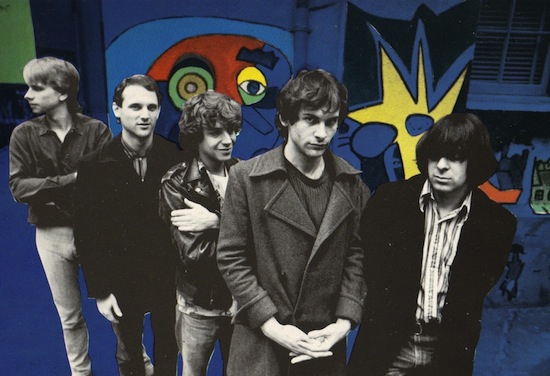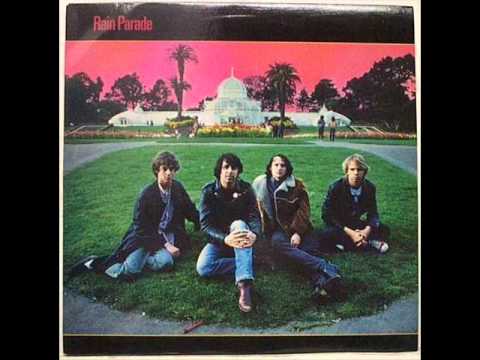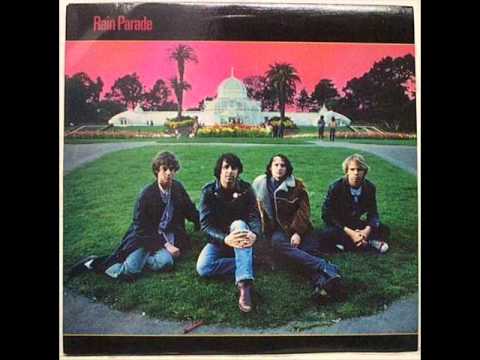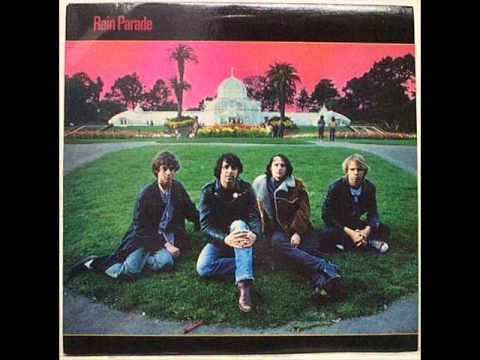It’s funny how certain moments stick in your memory. Over a lifetime of buying music, there have been innumerable times where I’ve found myself holding a slab of second-hand vinyl up to the light to examine its condition or digging through boxes of CDs in some dank cellar on Berwick Street, constantly pursuing the "Eureka!" moment that comes from discovering the album you’ve been after for ages or finding something that looks particularly intriguing. Yet one of my strongest recollections of encountering a record for the first time is via somebody else’s leap into the unknown. And that record is Rain Parade’s Explosions In The Glass Palace.
"Leap into the unknown" – sounds a bit daft, doesn’t it? In 2014, you’re never more than a few clicks away from ‘discovering’ some cool sounding new band from Croatia or becoming an instant expert on 70s Nigerian funk or accessing the entire history of popular music for a tenner a month. But in a small East Midlands town in the mid-80s, the world was a very different place indeed. There I was, sitting in a mate’s bedsit in that period between the pubs shutting at lunchtime and opening again in the evening, when my best friend came in bearing freshly-purchased vinyl – and not by Hawkwind or Jethro Tull (our two main lodestones at the time, oh yes). I’m still not sure why he bought these records – Explosions In The Glass Palace, plus a couple of albums from proto-grebos The Bomb Party and The Batfish Boys – but it was an entirely necessary move to drag us out of the prog rock miasma we’d been stumbling around in. And boy, did that Rain Parade sleeve look cool with its picture of the insouciant band sitting in front of large hot house (or glass palace), the sky behind them tinted a sickly shade of apocalypse pink…
Of course, I’d heard of Rain Parade before – probably in this Sounds interview ("In the space of two albums, Rain Parade have deluged us with a golden shower of truly classic tunes and words." You might want to skip the bit about animal porn) – so I also knew of the existence of something called the Paisley Underground in LA. (At the time, the only Paisley I knew was in Scotland, so this reference somewhat confused me.) Like many scenes before and since, the Paisley Underground had been conjured out of thin air when a member of The Three O’Clock randomly made the term up in an interview, but there was actually some validity to it – there was indeed a motley collection of bands around LA in the early 80s that had eschewed the then popular hair metal route to fame and fortune and were instead making music inspired by the psychedelic sounds of the 60s. Alongside Rain Parade, the main players in the scene were The Dream Syndicate, The Long Ryders, and The Bangles. Yes, The Bangles – ever wondered where Prince got the inspiration for his Paisley Park label from?
Despite receiving a lot of attention from the music media at the time (particularly in the UK – according to Rain Parade co-founder Matt Piucci in this excellent oral history of the scene, the band "never did shit in LA, ever."), and despite all of the core bands signing to major labels, the Paisley Underground seems strangely absent from the roll-call of reference points in rock history, certainly compared to other contemporaneous US scenes such as post-hardcore (Husker Du, Sonic Youth, Dinosaur Jr etc.), thrash metal (Metallica, Anthrax, Slayer etc.) and Athens, Georgia college rock (R.E.M., B-52s etc.)
The reasons for this are, I think, twofold. Firstly, other than The Bangles, none of the bands particularly flourished in a corporate rock system built primarily to ladle out the transatlantic aural soup of Phil Collins, Dire Straits et al – Rain Parade themselves split after Crashing Dream, their one and only studio album for Island. Secondly, and perhaps more importantly in terms of legacy, the scene didn’t really produce any identifiably ‘classic’ albums, or certainly not ones that have stuck in the collective unconsciousness of music fandom and criticism (I’m sure there’s some people who’d make a case for The Dream Syndicate’s debut, The Days Of Wine And Roses, but it’s still relatively obscure in the grand scheme of things).
That’s not to say it wasn’t influential – this is arguably where the neo garage/psych movement that’s been rumbling on ever since was first kick-started. And even at the time, there were bands on the periphery of the scene that subsequently went on to produce some great records (I’m thinking in particular of Thin White Rope, but also Green on Red and Mazzy Star, formed by Rain Parade’s other co-founder David Roback). Then there’s this fascinating piece from Alan McGee where he talks about his love of Rain Parade, specifically their debut LP Emergency Third Rail Power Trip (they certainly had a way with titles) – and it suddenly becomes clear that the upbeat melodic psych of this album provided the template not only for many of the early Creation bands, but also much of the jangle pop of the C86 generation.
Of course, I’m now about to make the case for Explosions In The Glass Palace as that great ‘lost’ defining album of the scene – or am I? Well, not really, because for starters it’s not actually an album (at five songs in 21 minutes, it just about qualifies as a mini-album). More pertinently, while I think it is indeed the high watermark of the Paisley Underground, for me it stands apart from the scene, or any scene for that matter, existing as a timeless and powerfully mysterious transmission that helped change the course of my listening habits forever. It was one of those ‘gateway’ records – which also included Hüsker Dü’s Candy Apple Grey and Big Black’s Atomizer – that truly engaged me with the possibilities of what could be done within a rock band format (beyond the grandstanding of prog) and just excited the hell out of me with the noise contained in its grooves.
It opens with ‘You Are My Friend’, and at first, it feels like this might be just a continuation of their direction on Emergency…, its chiming, bell-like riff mainlining a sweet spot between The Byrds and Television. But in terms of production, we’re in a different ballpark, the pretty but demure sonics of their debut replaced by a thicker, more visceral sound which anticipates the R.E.M. of Document and Green (I keep hearing a premonition of ‘Orange Crush’ in the riff). It’s upfront and immersive, but masks an ambivalent lyric that sets the downbeat tone for the whole album – rather than being a song of celebration, it’s actually about the death of a relationship and that "some broken things don’t mend". Despite this hint of sadness, Piucci’s vocal is pleasingly melodic and confident, and you can see why somebody somewhere thought that the band might have the commercial potential of The Bangles. Piucci also delivers a wonderfully discursive guitar (or is it sitar?) solo over the closing bars of the song, suggesting Neil Young in full flight as much as it does psych raga.
The vibe is mellowed considerably by ‘Prisoners’, but the dark undertow conversely increases. There’s the brief sound of acceleration, a car speeding into the distance on a desert highway, then a see-sawing bassline emerges from the heat haze. Piucci’s slide guitar paints mirages on the horizon while Eddie Kalwa’s reverbed snare drum hammers out a soporific beat. There’s a feeling of creeping stasis, the aftermath of some mid-west crime scene. When the vocal comes in – this time sung by bassist Steven Roback (brother of the already departed David) – the melody’s folky and sweet, but just listen to the words: "They say he took her away and he buried her bones." A lush, Floyd-esque refrain (in fact the entire song could easily fit on Meddle) leads into a drifting middle section, the sounds of children playing almost completely submerged by Will Glenn’s woozy, solarized organ. The final verse concludes with, "Someday he’ll join her there down by the side of the road" – brrrr! Cue distorted piano crash to fade.
‘Blue’ is another perfect psych pop miniature, and sounds like it’s about to morph into a sunny, laid-back take on Bowie’s ‘Rebel Rebel’. But even as the guitar lines effortlessly entwine, there’s the tale of another unhappy life playing out underneath – "all our tears wouldn’t bring her home" – to the extent that cognitive dissonance threatens to set in.
It’s at this point on the album that the sun definitively sets for good. ‘Broken Horse’ starts with a sombre picked acoustic, before a slow, deliberate vocal from Roback ramps up the gloom: "And one by one, I watched them run – they were my friends." There’s an incredible sense of pacing and drama, Roback singing like a condemned man from the inside of a jail cell, his words bouncing back at him from the steel door. We’re a long way from the band’s debut now, the 60s-inflected West Coast optimism crushed by a sense of claustrophobia and foreboding that’s reminiscent instead of Love’s downer psych classic ‘Signed DC’. An ascending guitar line teasingly promises to lift us out of this psychic incarceration, before dropping us back down in the cell: "Nothing is remembered, nothing ever said…" Then this time the guitar line leads us up into a blissful instrumental break that’s both beautiful and forlorn. It ends too soon, and we’re back to the start, the recapitulation of an inescapable state of mind. But no, there’s a cut to dead silence – then the break comes crashing back in again, more intense than before, suggesting that maybe there’s a way out after all… This track is less than four minutes long, but it feels like an epic.
But for all the preceding excellence, it’s difficult not to view the first four songs as merely preparing the way for the fifth and final track, the biblically intense ‘No Easy Way Down’. We all have songs that have burrowed themselves into our sub-conscious, into our very souls, passing judgement on everything else we hear, confident that it’ll never deliver the same frisson and endorphin jolt. ‘No Easy Way Down’ is one such song for me, and every time that swaggering reptilian pulse of guitar blasts out of the speakers, I’m transported, the hairs on my neck literally raised. There’s a migraine-pitch peel of Hammond and a coiling Eastern guitar motif, then the beat kicks in like John Bonham playing ‘Tomorrow Never Knows’. It’s heavy, threatening, trance-like, and it sucks the light out of the room. The lyric is darkly allusive once again: "They called and told me yesterday that all I know is inside out, I can’t believe it", while the chorus manages to be both defiant and resigned, the final word of the title echoed by a demonic whisper. After the second time around, there’s a dramatic chord change, an organ build, and then we plunge into the void, the guitar like fingers scrabbling to hold onto something, anything. Oh god, then the string quartet starts playing, alluring but deadly, the sirens’ orchestra waiting at the bottom of the pit. Just as the tension is getting too much, a single guitar note pierces the air like a burning shaft, while the grinding cello underneath heralds an incredible horror show passage that verges on infernal atonality… Piucci maintains that Rain Parade were never a jam band, and that everything was worked out in advance, but for all its intricate arrangement, ‘No Easy Way Down’ still feels to me like an unrepeatable piece of dark magic.
Explosions In The Glass Palace might be only 21 minutes of music, but it easily packs the same punch as albums twice its length, a condensed hit of psychedelic rock re-imagined for Reagan’s America, both seductive and desolate. Rain Parade (who recently reformed and played all five of these songs in their live set) might never have reached these heights or plumbed these depths again, but to have created such a perfectly-formed piece of sonic art is surely enough of an achievement for any band.





